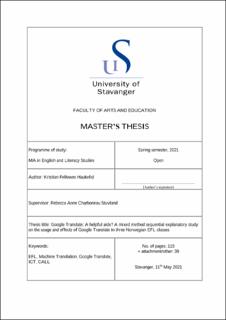| dc.description.abstract | This thesis investigates how learners in Norway use Google Translate to aid them in EFL writing as well as how the usage of Google Translate affects the quality of the texts they write. A mixed method study was used in three Norwegian EFL classes situated in the same school along with learner stimulated recall interviews and teacher interviews. The aim of the study was to determine how effective Google Translate is at helping Norwegian learners at different performance levels and to see how dependant these learners are on Google Translate to help them in EFL writing.
Two writing sessions were conducted to gather data on learners’ usage of Google Translate and determine whether the translation tool had any effect on the quality of their written products. The first writing session consisted of learners using dictionaries to help them translate from Norwegian to English, and in total, 33 learners participated in this writing session. In the second writing session, learners were encouraged to use Google Translate as they would normally to help in EFL writing, and 33 learners participated in this writing session, 22 of whom used Google Translate. By comparing vocabulary, syntax errors, subject-verbal concord errors, essay length, and spelling mistakes between the texts from the two writing sessions of learners who used Google Translate in the second writing session, comments could be made on the effectiveness Google Translate has on the quality of learners’ texts. A separate analysis was conducted of how Google Translate was being used by learners in the second writing session, i.e. how many times Google Translate was used to translate words, phrases, sentences, entire texts or for other purposes.
Based on the analysis comparing two sets of 22 learners’ screen recorded videos and the learners’ writing along with information from stimulated recall interviews and teacher interviews, it seems that learners’ current usage of Google Translate does not affect the quality of their written product in a positive nor negative way, except for syntax related errors which lowered for all learner groups from the first to the second writing session. Google Translate mostly serves as a quicker alternative to dictionaries as it provides translations at a much fast speed compared to dictionaries. Further, learners mostly use Google Translate to aid in the translation of words and phrases, rarely using it to translate whole sentences or longer texts. However, there is a disparity between lower performing learners, average performing learners, and higher performing learners in how much they use the tool.
Furthermore, there is a lack of training given to learners and teachers on how to use Google Translate as an efficient translation tool. Both learners and teachers that participated in the study reported a lack of training received on proper usage of the tool and reviewing 31 screen recorded videos from the second writing session, it was clear that learners lacked knowledge of the many capabilities the tool has to offer.
There has previously been concern amongst teachers that Google Translate hinders learners in learning English as the translation tool produces incorrect output or that learners use the tool to translate large amounts of text. However, statements from teacher interviews reveal that these teachers seem to have become more acceptant of the translator being used in their class. Previous studies also reveal that Google Translate has reached the point where it has the capability of providing output equivalent to the minimum level of accuracy required for university entrance, thereby providing output better than what most learners in primary school could produce themselves (Mundt & Groves, 2015; Stapleton & Leung, 2019).
Finally, based on the analysis of 64 screen recordings, the author of this thesis argues that Google Docs and other word processors should be a greater concern for teachers than Google Translate and other tools that aid in translation. This is due to a substantial number of learners who participated in the study being heavily dependent on the grammatical and spelling correction tools that the software provides, making it difficult for teachers to assess whether learners know various grammatical rules and possess the ability to apply these rules in written texts. | |
